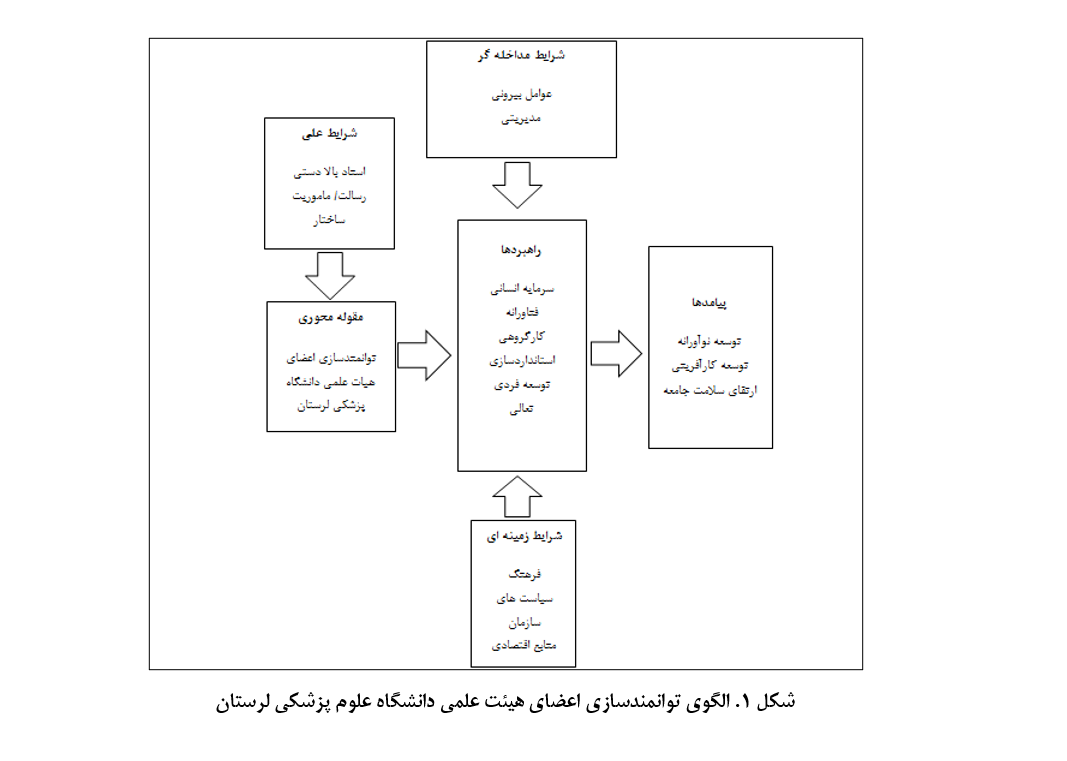Designing a Faculty Empowerment Model for Lorestan University of Medical Sciences Using a Grounded Theory Approach
Keywords:
Empowerment, faculty, causal factors, interventionist, background conditions, strategies, consequences, external dataAbstract
One of the major challenges facing higher education in Iran is the quantitative and qualitative development as well as the empowerment of university faculty members. Therefore, the present study aimed to design an empowerment model for faculty members at Lorestan University of Medical Sciences. The research method is applied in terms of purpose, qualitative in terms of data type, and systemic grounded theory in terms of nature and study type. The target population of the study consisted of experts in the field of human resources. A purposive theoretical sampling method was employed, and 15 experts were selected for interviews. The research instrument was a semi-structured interview, in which the dimensions, components, and indicators of the faculty empowerment model for Lorestan University of Medical Sciences were identified. Initially, in-depth interviews were conducted with experts, and through open coding, the indicators were extracted. Using axial coding, the indicators were categorized into components, and the findings were sent to 15 experts for validation. Finally, through selective coding, interviews, and brainstorming, the components and indicators were identified and finalized. The final model consisted of 5 dimensions, 17 components, and 104 indicators. After final approval and prioritization by experts, the dimensions, components, and indicators of the model were outlined and subsequently validated by experts. The findings of the present study suggest that this model can help identify key factors contributing to the empowerment of faculty members at medical universities.
Downloads
References
Qadhi SM. Generative AI, Research Ethics, and Higher Education Research: Insights From a Scientometric Analysis. Information. 2024;15(6):325. doi: 10.3390/info15060325.
Qazi MA, Sharif MA, Akhlaq A. Barriers and facilitators to adoption of e-learning in higher education institutions of Pakistan during COVID-19: perspectives from an emerging economy. Journal of Science and Technology Policy Management. 2024;15(1):31-52. doi: 10.1108/JSTPM-01-2022-0002.
Alwali J. Innovative work behavior and psychological empowerment: the importance of inclusive leadership on faculty members in Iraqi higher education institutions. Journal of Organizational Change Management. 2024;37(2):374-90. doi: 10.1108/JOCM-03-2023-0084.
Esmaili L, Jamali A, Ghorchian N. Identifying and Analyzing the Dimensions and Components of Improving Social Intelligence among the Faculty Members of Farhangian University of Tehran. Sociology of Education. 2024;10(1):204-13. doi: 10.22034/ijes.2024.2009561.1454.
Mohammadi Fomani M, Sharifi A, Etemad Ahari Aa. Development, Validity, and Reliability Assessment of the Professional Ethics Scale for Faculty Members of Farhangian University. Iranian Journal of Educational Sociology. 2024;7(2):8-15. doi: 10.61838/kman.ijes.7.2.2.
Ghasemi R, Marzieh A, Abbas R, Hamid A, editors. Identifying the Skills Needed by Academic Staff at Allameh Tabatabai University to Empower Them2023.
Abbaspour A, Bazargan A, Rahimian H, Barzovian S, Zare. Researching the Quality of Faculty Performance: Presenting a Conceptual Model. Journal of New Educational Thoughts. 2018;15(1):91-111.
Ojaghi A, Saibani H, Savadi M. Designing a Model of Human Resource Empowerment in Sports Organizations. Sports Sciences Quarterly. 2023;13(4).
Selajegeh M, Mirzazadeh A, Ghandomkar R. Evaluation of Faculty Empowerment Programs in Medical Science Education: a review study. Iranian Journal of Education in Medical Sciences. 2022;18(81):435-45.
Stavrianeas S, Bangera G, Bronson C, Byers S, Davis W, DeMarais A, et al. Empowering faculty to initiate STEM education transformation: Efficacy of a systems thinking approach. PLoS ONE. 2022;17(7). doi: 10.1371/journal.pone.0271123.
Bekr M, Zarei M. Designing a model for empowering nursing managers in educational and therapeutic hospitals of Tehran University. Nursing Management Quarterly. 2019;9(4):96-111.
Malai J, Haghighi M, Nasrollahi M. Designing a Model of Human Resource Empowerment with a Digital Approach in the Medical System Organization Using Qualitative and Quantitative Methods. Scientific Journal of Medical Organization of the Islamic Republic of Iran. 2023;41(1):53-74.
Islami N, Hosseini M, Makarem A. Investigating the Effects of Empowerment Courses for Academic Staff at Mashhad University of Medical Sciences on Their Satisfaction and Knowledge in Teaching and Evaluation Skills. Journal of Mashhad Dental Faculty. 2019;44(1):3-13.
Jesus J. How psychological empowerment impacts task performance. Millennium Nucleus on the Evolution of Work. 2022;10(88):33-59.
Van L, Scheele KA. Improving Graduate Medical Education Through Faculty Empowerment Instead of Detailed Guidelines. Academic Medicine. 2021;96(2):173-5. doi: 10.1097/ACM.0000000000003386.
Owen D, Boswell L, Opton L, Franco C. Empowerment, and job satisfaction before implementing an academic model of shared governance. Applied Nursing Research. 2018;41:29-35. doi: 10.1016/j.apnr.2018.02.001.

Downloads
Published
Submitted
Revised
Accepted
Issue
Section
License
Copyright (c) 2025 Journal of Study and Innovation in Education and Development

This work is licensed under a Creative Commons Attribution-NonCommercial 4.0 International License.










